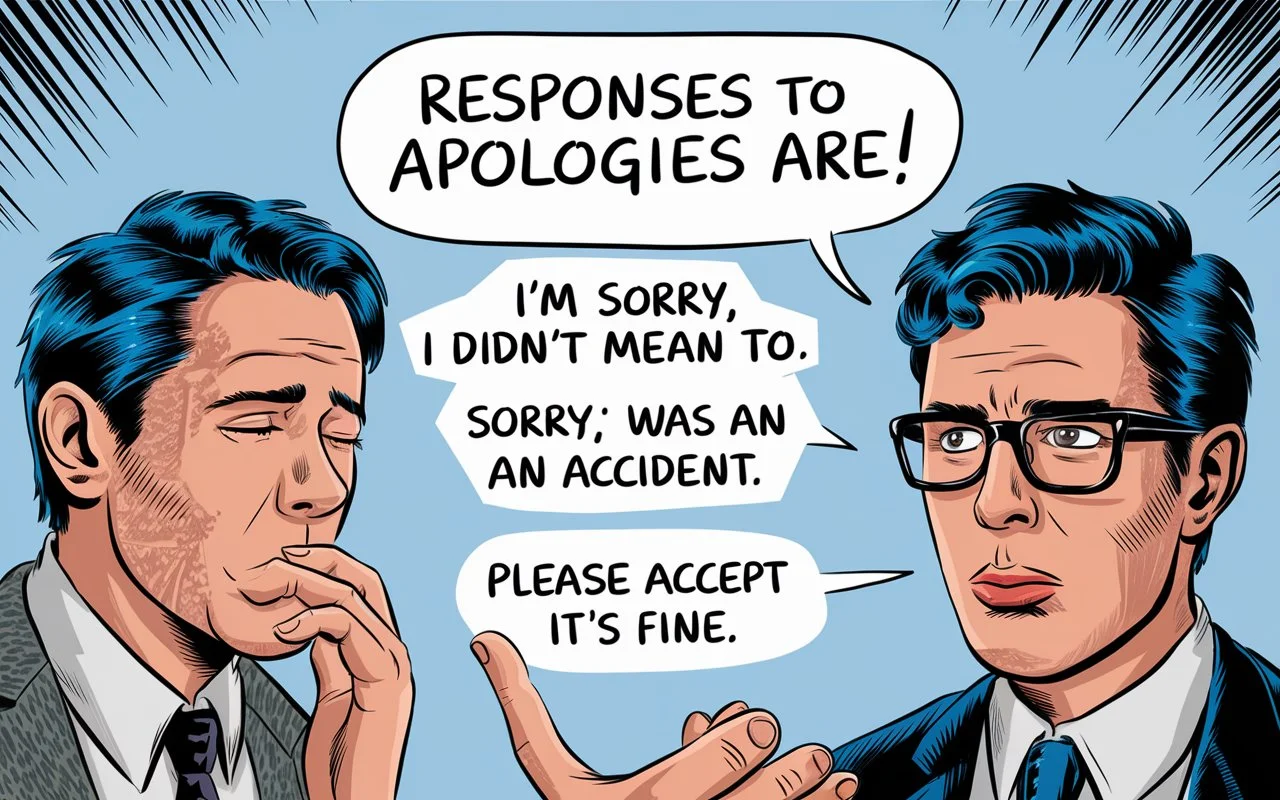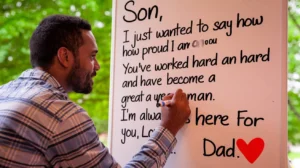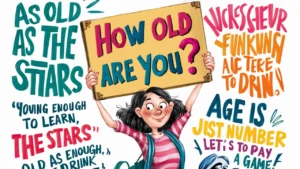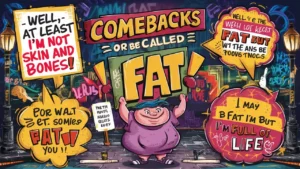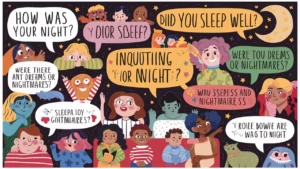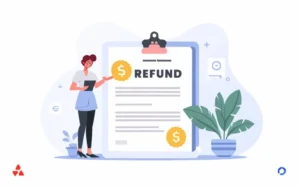Apologies are a part of everyday interactions, and how we respond to them can set the tone for moving forward positively.
Sometimes, injecting a bit of humor into our responses can lighten the mood and diffuse any tension. In this article, we explore 30 creative and humorous replies to apologies, each designed to foster understanding and laughter.
Whether you’re smoothing over a small mishap or simply keeping things light, these responses are sure to bring a smile to both parties involved.
Creative Responses to Apologies
“No Worries, It’s Just A Hiccup!”
When someone apologizes for a minor slip-up, responding with “No worries, it’s just a hiccup!” can convey a sense of reassurance while downplaying the issue. It acknowledges the mistake without making it seem like a big deal. Imagine a friend accidentally spilling a drink at a party—you reassure them with this lighthearted response, ensuring they know it’s all forgiven.
“Apology Accepted, Now Let’s Have Some Ice Cream!”
Turning an apology into an opportunity for a sweet treat can add a playful twist to the situation. “Apology accepted, now let’s have some ice cream!” suggests moving on from the apology to enjoy something pleasant together. It shows forgiveness while creating a moment of shared enjoyment—a perfect way to lighten the mood after a misunderstanding.
“Don’t Sweat It, Everyone Makes Mistakes!”
For those moments when someone feels overly apologetic for a common mistake, saying “Don’t sweat it, everyone makes mistakes!” reassures them that imperfections are part of being human. It encourages a positive outlook and helps the other person feel more at ease, knowing that their mistake isn’t being held against them.
“All Is Forgiven, Let’s Move On!”
When you want to swiftly move past an apology and focus on the present, “All is forgiven, let’s move on!” does the trick. It acknowledges the apology sincerely while emphasizing the importance of leaving the incident in the past. This response is effective in maintaining momentum in a conversation or relationship.
“You’re Only Human, It’s All Good!”
Acknowledging someone’s humanity and fallibility can be comforting in response to an apology. “You’re only human, it’s all good!” communicates empathy and understanding, reassuring the person that their mistake hasn’t affected your opinion of them. It fosters a sense of acceptance and mutual respect.
“It’s Water Under The Bridge Now!”
To express that you’ve completely moved on from an apology-worthy incident, “It’s water under the bridge now!” is a perfect choice. This phrase suggests that the issue is now resolved and no longer worth dwelling upon. It’s a friendly way to signal closure on the matter and move forward positively.
“Mistakes Happen, No Hard Feelings!”
When someone is genuinely sorry for a mistake, responding with “Mistakes happen, no hard feelings!” affirms their apology while emphasizing that you bear no grudge. It encourages a forgiving atmosphere and helps maintain a positive relationship by swiftly putting the incident behind.
“We’re Cool, No Harm Done!”
To reassure someone that everything is fine after an apology, “We’re cool, no harm done!” conveys a sense of ease and camaraderie. It reassures the other person that the incident hasn’t caused any lasting damage and that you’re ready to move forward without dwelling on the mistake.
“Thanks For Apologizing, We’re Still Friends!”
When a friend apologizes for a misstep, expressing gratitude with “Thanks for apologizing, we’re still friends!” reinforces the value of your friendship while accepting their apology. It acknowledges their effort to make amends and reaffirms your bond, ensuring that the incident doesn’t strain your relationship.
“Let’s Laugh It Off And Forget About It!”
Injecting humor into your response can defuse tension and make light of a minor mishap. “Let’s laugh it off and forget about it!” suggests moving past the apology with a smile, turning the incident into a shared humorous moment. It encourages both parties to not take things too seriously and maintain a positive outlook.
“No Big Deal, We’re All Good!”
To downplay the seriousness of an apology-worthy incident, saying “No big deal, we’re all good!” reassures the other person that you don’t hold their mistake against them. It communicates a laid-back attitude and helps maintain a relaxed atmosphere, ensuring that the incident doesn’t overshadow your interaction.
“Apology Noted, Let’s Keep Going!”
Acknowledging someone’s apology and swiftly moving on can keep the conversation flowing smoothly. “Apology noted, let’s keep going!” accepts their apology succinctly and redirects the focus to the present or future. It’s an effective way to maintain momentum in a discussion or activity.
“It’s Okay, We All Mess Up Sometimes!”
When someone apologizes for a mistake, offering reassurance with “It’s okay, we all mess up sometimes!” shows empathy and understanding. It normalizes making mistakes as part of being human, making the other person feel less self-conscious about their error. It’s a supportive response that encourages self-forgiveness.
“I Appreciate Your Apology, Let’s Move Forward!”
Expressing gratitude for someone’s apology can strengthen your relationship. “I appreciate your apology, let’s move forward!” acknowledges their effort to make amends and emphasizes your readiness to put the incident behind. It encourages a positive outlook and fosters mutual respect.
“It’s All In The Past Now, Don’t Worry!”
To reassure someone that an apology-worthy incident is behind you, “It’s all in the past now, don’t worry!” conveys a sense of closure and reassurance. It signals that you’ve moved on from the incident and encourages the other person to do the same, promoting a forward-looking mindset.
“No Need To Apologize, It’s Fine!”
When someone apologizes unnecessarily, responding with “No need to apologize, it’s fine!” reassures them that their actions didn’t cause any harm. It acknowledges their consideration while downplaying the need for an apology, ensuring they feel at ease and valued.
“Thanks For Saying Sorry, But It’s Really Okay!”
Expressing appreciation for an apology while emphasizing that it wasn’t necessary can ease any lingering discomfort. “Thanks for saying sorry, but it’s really okay!” shows gratitude for their gesture while reassuring them that the situation has been resolved. It fosters positivity and mutual understanding.
“Let’s Not Dwell On It, Everything’s Fine!”
Encouraging someone to move past an apology-worthy incident with “Let’s not dwell on it, everything’s fine!” communicates a desire to maintain a positive atmosphere. It redirects the conversation away from the mistake and encourages both parties to focus on enjoying the present moment.
“I Forgive You, Let’s Not Make It Awkward!”
When forgiveness is needed after an apology, saying “I forgive you, let’s not make it awkward!” can alleviate any tension or discomfort. It emphasizes your willingness to move forward without allowing the incident to affect your relationship or interaction. It’s a gracious way to restore harmony.
“Apology Accepted, Let’s Make Better Memories!”
Turning a potentially negative moment into a positive opportunity, “Apology accepted, let’s make better memories!” suggests using the incident as a learning experience. It encourages both parties to focus on creating positive experiences moving forward, reinforcing a constructive outlook.
“No Harm Done, We’re Still Good!”
To reassure someone that their mistake hasn’t caused any lasting damage, saying “No harm done, we’re still good!” affirms your positive relationship. It acknowledges their apology while emphasizing that the incident hasn’t affected your opinion of them. It fosters a sense of mutual respect and understanding.
“It’s All Good, Let’s Not Stress About It!”
When someone apologizes for a minor issue, responding with “It’s all good, let’s not stress about it!” reassures them that everything is okay. It encourages a relaxed atmosphere and helps the other person feel at ease, knowing that the incident hasn’t caused any significant concern.
“I Appreciate The Apology, Let’s Keep Smiling!”
Expressing gratitude for someone’s apology with “I appreciate the apology, let’s keep smiling!” acknowledges their effort while maintaining a positive tone. It encourages both parties to stay upbeat and focuses on moving forward with a friendly attitude. It’s a warm and encouraging response.
“No Worries, We’ve All Been There!”
To show empathy for someone who is apologetic about a mistake, saying “No worries, we’ve all been there!” normalizes the experience of making mistakes. It reassures them that their error is understandable and forgivable, promoting a supportive atmosphere and mutual understanding.
“It’s Okay, Let’s Move On And Be Happy!”
When you want to swiftly move past an apology and emphasize happiness, saying “It’s okay, let’s move on and be happy!” redirects the conversation to positive emotions. It reassures the other person that the incident hasn’t affected your mood and encourages them to do the same, fostering a cheerful atmosphere.
“Thanks For Apologizing, Now Let’s Have Fun!”
Turning an apology into an opportunity for enjoyment, “Thanks for apologizing, now let’s have fun!” suggests moving past the incident to enjoy a positive experience together. It reinforces forgiveness while creating an upbeat atmosphere, ensuring that both parties can focus on having a good time.
“No Hard Feelings, It’s All Good!”
When someone apologizes, saying “No hard feelings, it’s all good!” reassures them that there are no lingering negative emotions. It emphasizes forgiveness and understanding, promoting a harmonious relationship moving forward. It’s a simple yet effective way to maintain positivity.
“It’s Fine, We’re Still Friends!”
To reassure someone that an apology hasn’t affected your friendship, saying “It’s fine, we’re still friends!” affirms the strength of your relationship. It acknowledges their apology while emphasizing that your bond remains unchanged. It promotes trust and mutual support.
“Apology Accepted, Let’s Not Worry About It!”
Accepting someone’s apology gracefully with “Apology accepted, let’s not worry about it!” encourages both parties to move past the incident swiftly. It emphasizes forgiveness and a desire to focus on positive interactions moving forward. It’s a friendly and reassuring response.
“No Biggie, Let’s Move Forward Together!”
To downplay the seriousness of an apology-worthy incident, saying “No biggie, let’s move forward together!” emphasizes that the mistake hasn’t caused any lasting damage. It promotes a collaborative mindset and encourages both parties to work together positively. It’s a supportive and forward-thinking response.
Conclusion
In conclusion, responding to apologies with humor and positivity can strengthen relationships and create memorable interactions. Each of these 30 creative replies is designed to foster understanding, forgiveness, and laughter, ensuring that apologies become opportunities for connection rather than sources of tension. By choosing responses that acknowledge mistakes while promoting a positive outlook, we can navigate social interactions with grace and goodwill.
Incorporating these responses into your conversations can turn potentially awkward moments into opportunities for bonding and mutual respect. Whether among friends, colleagues, or loved ones, embracing humor and kindness in response to apologies enriches our relationships and enhances our everyday interactions.
Remember, the way we respond to apologies reflects our values of empathy, forgiveness, and positivity. So, next time someone says sorry, consider adding a touch of humor and understanding to brighten their day and strengthen your connection.

